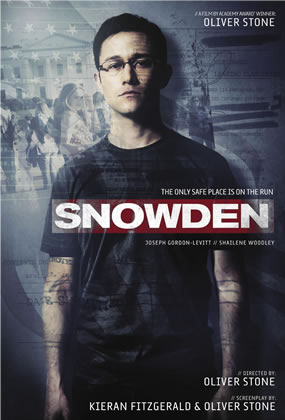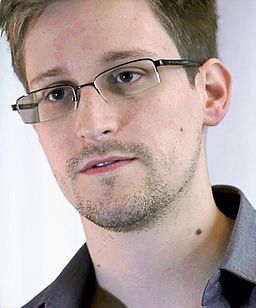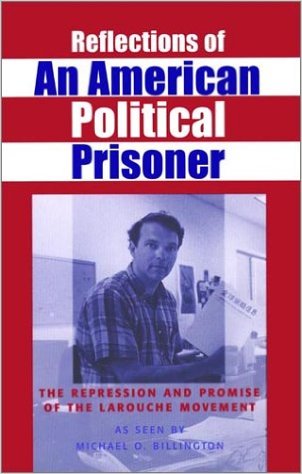Movie Review
The “Snowden” Movie: Truth not Propaganda
About Bush and Obama’s Crimes Against Humanity
by Michael Billington
September 2016
Directed by Oliver Stone
Written by Oliver Stone and Kirean Fitzgerald
Based on Books by Luke Harding and Anatoly Kucherena
Released in USA Theaters in September 2016
This article appears in the September 30, 2016 issue of Executive Intelligence Review and is re-published here with permission. This reviewer has unique insight into the NSA police state apparatus exposed in this film; he was one of the LaRouche associates illegally persecuted and prosecuted, and then was handed a 77 year sentence. During his decade behind bars, Mike Billington produced a book and published many scholarly works. He is currently the Asia Desk editor of Executive Intelligence Review.

A poster for the movie Snowden, directed by Oliver Stone. |
Sept. 24—The film Snowden, co-written and directed by Oliver Stone, has been released to the public at a crucial moment in American history. As intended by Stone, the film is having a profound impact on the population, forcing viewers to come to terms with the police state they have lived in since George Bush and Dick Cheney launched the NSA surveillance of every American citizen (with billions of others) in the aftermath of the British-Saudi 9/11/2001 terrorist attack on the United States. And, as the film powerfully demonstrates, Obama, despite his flowery pledges to end this criminal surveillance system, only expanded it further.
The release of Mr. Stone’s movie could not have come at a more compelling moment. During the week of the film’s premier, Barack Obama vetoed the Justice Against Sponsors of Terrorism Act (JASTA), spitting on the graves of the 3,000 Americans who died in the 9/11 attacks.
Obama’s subservience to British and Saudi interests, seen in his refusal to release the “28 pages” for seven years and his veto of JASTA, goes hand in hand with his defense of the NSA surveillance state which is depicted in the film.
At the same period that Obama worked so closely with British interests, Hillary Clinton was complicit in the murder of Libyan President Muammar Qaddafi, and also labeled Edward Snowden a criminal who should “come home and face the music.”
The Real Edward Snowden

Edward Snowden. |
Despite media characterizations, Edward Snowden was not some mid-level cog or “hacker” in the intelligence community. He was, in fact, a leading creator of many of the surveillance programs from within the CIA and the NSA. He was considered a genius and moved rapidly to extremely high level assignments, designing several of the most sophisticated programs. His job at his last position at a government intelligence center in Hawaii was—in part on his own suggestion—to set up a centralized operation which would compile all the disparate NSA surveillance programs into a single database. It was this centralized program which he would later copy and leak to the world.
Snowden’s background, as shown in the film, was as a deeply patriotic individual who wished to serve his country. He personally revolted against what he recognized as a criminal use of these programs during the Bush/Cheney years, but he stuck with the system when Obama, in his campaign speeches in 2008, pledged to end it. Only when it was clear that Obama had lied and was going even further than Bush, did Snowden decide he had to act on his own.
Agence France-Presse reported on Sept. 22 that Oliver Stone, presenting his film at the San Sebastian film festival in Spain’s Basque country, said of Obama: “Obama has doubled down on the Bush administration policies. [He] has created . . . the most massive global security surveillance state that’s ever been seen, way beyond East Germany’s Stasi [secret police], way beyond that. . . . Let’s beware of fascists and tyrants who tell us ’We are going to protect you.’ ”
Truth not Propaganda
What Mr. Stone has crafted is not a heavy-handed political propaganda piece. If anything, much of what is presented in the movie is understated. Nothing is explicitly declared to be the truth. Rather, the events of Snowden’s life simply unfold, over a period of years, as the realization of what his government is doing becomes increasingly inescapable. And the members of the viewing audience, who have all lived through these events, are presented with the same moral dilemma as Snowden’s by the time he decides to act. What makes it even more compelling is that it is all true.

The White House
President Obama and his Secretary of State, Hillary Clinton, in Washington, D.C., May 1, 2009. |
The film is a dramatization, not a documentary, but it was written in cooperation with Edward Snowden personally. It switches seamlessly between dramatization and documentary film clips: President Obama promising to end the illegal surveillance during his 2008 campaign; Hillary Clinton, in a debate, denouncing Snowden as a criminal who “stole very important information that has unfortunately fallen into a lot of the wrong hands,” and who must “face the music”; Director of National Intelligence James Clapper telling Sen. Ron Wyden in Senate testimony in 2013 that there were no programs collecting data on millions of Americans (it was this outright lie which Snowden considered the last straw compelling him to act); and even clips of Snowden himself, who is otherwise persuasively portrayed in the film by Joseph Gordon-Levitt.
The film incorporates other aspects of the descent into barbarous criminality under the Bush and Obama administrations. Depictions of drones targetting and destroying human targets identified only by the cell phone being used, with no regard for who else was in the area, are shocking to see.
Although it is not in the film, it is well known that Barack Obama takes great pride in his narcissistic belief that as Emperor, he has the power and the right to compile lists of those he will kill each week through drone strikes, with no concern over due process, nor concern for the “collateral damage.” The film does dramatize the well-known story of one drone operator who saw a small child emerge from the house he was targeting, just before the hit, only to be told by his superior not to feel bad, that it was only a dog.
Time to Act
Snowden has received very little attention in the major media, and a number of prominent film critics have panned it, but it has been observed that the large audiences that are streaming to see the film leave in a very subdued state, clearly reflecting upon not only the historical drama, but what it says about themselves, for tolerating such vast crimes under Bush and Obama. The unstated question at the end—a question never asked in the film but one which has been placed clearly in the mind of each viewer, is “Who are the real criminals here? Who is it that should be brought to justice?”
In the volatile environment this Autumn in the United States, as Obama stands exposed as a partner of terrorists—in his veto on behalf of Saudi Arabia of the JASTA bill that would allow American victims of the Saudi-funded 9/11 attack on the United States to sue the Saudis in court—the exposure of Obama in the Snowden film must add to the moral pressure on all Americans, and citizens of the world, to remove this President from office, and bring him to justice for his crimes against the Constitution and against humanity.
 |
Reflections of An American Political Prisoner: The Repression and Promise of the LaRouche Movement |
